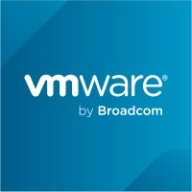

RHEV and VMware vSphere both compete in the virtualization platform sector. VMware vSphere holds the upper hand due to its superior features, advanced management tools, and strong support network.
Features: RHEV benefits from its open-source nature, integration with Red Hat solutions, and powerful features like KVM virtualization technology and memory page sharing. VMware vSphere is known for its advanced management capabilities, such as VMotion for real-time movement of virtual machines, and high availability features. It provides comprehensive backup and recovery options, making it appealing for enterprise environments.
Room for Improvement: RHEV could enhance its user interface and integration with third-party applications, broaden its support network, and improve performance metrics in high-demand scenarios. VMware vSphere might benefit from more cost-effective pricing models, clearer licensing terms, and streamlined integration processes with non-VMware applications.
Ease of Deployment and Customer Service: RHEV features straightforward deployment and seamless integration within Red Hat ecosystems but relies on community-driven support. VMware vSphere, with its extensive documentation and robust support network, is noted for its ease of deployment in large and complex environments.
Pricing and ROI: RHEV offers a cost-effective option appealing to budget-conscious businesses, promising sustainable ROI, especially when integrated with Red Hat solutions. VMware vSphere’s higher initial investment is compensated by its extensive capabilities and tools, offering substantial long-term ROI, suitable for those prioritizing comprehensive solutions over cost.
| Product | Market Share (%) |
|---|---|
| VMware vSphere | 18.9% |
| RHEV | 2.4% |
| Other | 78.7% |

| Company Size | Count |
|---|---|
| Small Business | 21 |
| Midsize Enterprise | 5 |
| Large Enterprise | 12 |
| Company Size | Count |
|---|---|
| Small Business | 175 |
| Midsize Enterprise | 137 |
| Large Enterprise | 259 |
Red Hat Enterprise Virtualization, or RHEV, is a leading open standard enterprise virtualization management solution. This solution supports virtualization of servers and desktops using the same infrastructure and a single easy-to-use interface.
Because RHEV is based on open standards, it is vendor-independent and a lot more cost effective and flexible than proprietary solutions.
VMware vSphere offers robust virtualization capabilities with features that enhance data center performance and optimize workloads. Centralized management and ease of deployment make it a cost-effective choice for many industries.
VMware vSphere is recognized for its high availability, vMotion, and Distributed Resource Scheduler, essential for efficient server infrastructure management. Users value its virtual machine management, seamless live migration, and strong resource allocation across data centers. Though the web client can be slow, and individual management of multiple ESXi hosts is challenging without central management, vSphere remains popular due to its flexibility and integration capabilities. While fault tolerance and free version features have their limitations, the product supports private clouds and hybrid cloud deployments effectively.
What are the key features of VMware vSphere?VMware vSphere is widely used in industries to manage server infrastructure effectively, hosting mission-critical applications like ERP and SQL servers. It supports development, testing, and backup environments, contributing to data center consolidation and cost reduction while enabling private and hybrid cloud setups.
We monitor all Server Virtualization Software reviews to prevent fraudulent reviews and keep review quality high. We do not post reviews by company employees or direct competitors. We validate each review for authenticity via cross-reference with LinkedIn, and personal follow-up with the reviewer when necessary.